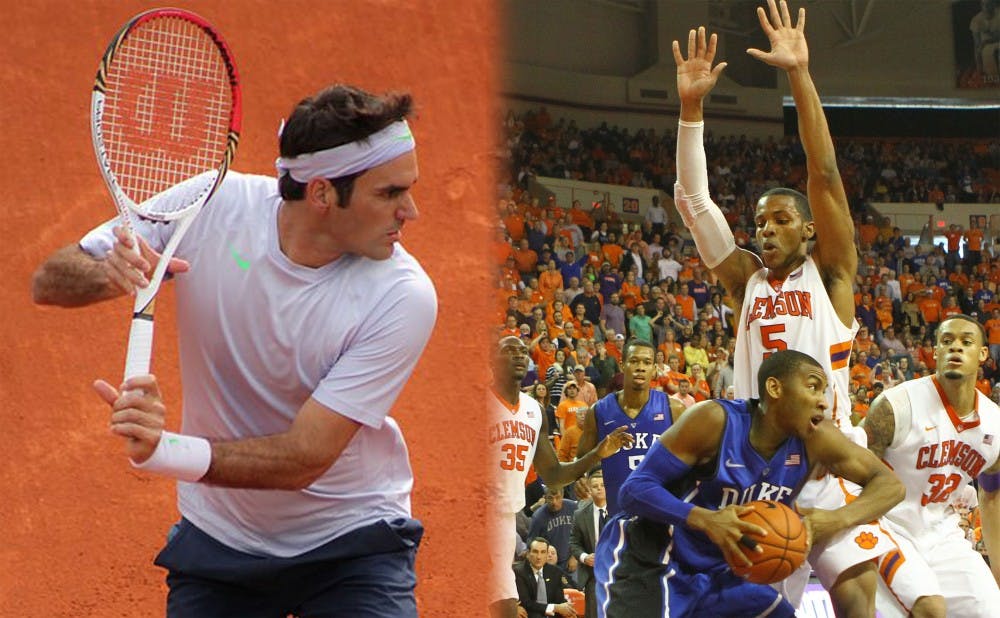I didn't expect Roger Federer would still be alive in the Australian Open by the time this column was written. For the greatest tennis player of all-time (please don’t give me that crappy Rafael Nadal domination counterargument—to paraphrase Rasheed Wallace, grand slams don’t lie), the past year has been a sharp drop from the precipice of invincibility to the only rarefied air he now occupies.
As a Federer Fan (FF), the recent slump has been especially… uncomfortable. At his peak, a loss was unconscionable: against anyone not named Rafa or Novak, you could rest assured the Fed Express would roll through the station on time in a tidy, two-hour affair. Now, hiccups are frequent, and an unknown opponent represents a true obstacle rather than a minor speed bump on the road to victory.
On one level, it’s frustrating to see a player so gifted lose to the plebes that litter the lower ranks. But as a human being, laced with nostalgia and perspective, these losses make me a bigger FF than ever.
Because in hindsight, us FF’s were spoiled. We took for granted his magisterial forehand—we knew it would find the sideline or that impossible angle; he didn’t hit the hardest, but he yielded his racket like a spade, which dug him out of great holes time after time. His forehand, considered the greatest stroke in tennis history, had become—after countless penetrating drives and cheeky drop shots—almost mundane. For FF’s, wins were joyless: they were supposed to happen.
Now Federer is not expected to win big matches. Sometimes he shanks his forehand, the ball blasting off his frame into the rafters. He yells. He sweats. He loses meekly, sulking fecklessly off the court.
The complaints well up inside the FF: “He used to never lose.” “Why does he punish me this way?” “I didn’t sign up for this.”
I fear the same phenomenon is occurring in Durham: although our subject lacks the widespread national support Federer holds, it’s been undergoing a notable change recently. But while fans lament the struggles of Duke basketball—which, like Federer, finds itself in its lowest ranking in years and boasts only one major championship since January 2010—I find it exciting.
“Winning isn’t everything; it’s the only thing”—it’s one of the truisms of sports. And yes, from the perspective of coaches and players, winning is what’s important: it brings job security, accolades, even Wheaties boxes. But us fans can unlock something more through watching our favorite teams.
Simply put, we, assuming your tastes somewhat mirror mine, watch sports to see the incredible—Steph Curry’s jumper, Adrian Peterson’s gallops, Zlatan Ibrahimovic’s…everything. At the team level, the incredible takes on a different form: we hope to see comebacks, underdog triumphs, the unexpected and inspired.
That was Duke—the underdog, the team that upset Jerry Tarkanian’s UNLV. When Duke first won the ACC in 1985, I’m guessing it was a surprise to fans—not just a prerequisite for March Madness glory.
And then 30-win seasons became the standard. Duke would always win. Why? Because Duke was Duke.
I don’t mean to harp on this, or complain about the Crazies’ entitlement, or even exaggerate Duke’s difficulties this season. Unlike Federer, Duke receives a natural shot of HGH every year via its recruiting class.
But the glory days of the early '90s, the 1998-2002 run that cemented Duke’s status as a premier program? Those belong to the past. For various reasons—the one-and-done rule, the recent sprawl of quality NCAA programs—Duke won’t again have a dominant squad like it did in ’92 or ’01.
But no one will. The NCAA is now a place of parity, with capable opponents lining the schedule. Like how Tommy Robredo can now beat Federer, Lehigh can beat Duke. It’s a brave new world—and for a proverbial giant, it’s scary.
Yes, given the high standards of both Duke and Federer, such losses can be shocking. But they’re opportunities. Fans, I beg you to drop your expectations—it’s liberating.
Because I don’t expect it now, when I catch a glimpse of vintage Federer, I stop and savor it—all of it. The pinpoint serves. The gorgeous forehands. The otherworldly court vision.
Some nights Duke struggles. Some nights its defensive effort is, um, disinterested.
But then some nights Andre Dawkins springs high with the most flawless form, his jumper not even considering touching the rim. Some nights Quinn Cook spins through the defense like Baryshnikov, flipping in shots amongst the trees. Some nights Jabari Parker does something that makes upperclassmen feel like octogenarians. Some nights Coach K motivates and orchestrates like the legend he is. Some nights the team resembles a juggernaut I vaguely recall, and I feel a tickle of surprise—a stroke of luck that I got to witness this.
With this team, some nights are beautiful. Treasure them.
Get The Chronicle straight to your inbox
Signup for our weekly newsletter. Cancel at any time.

